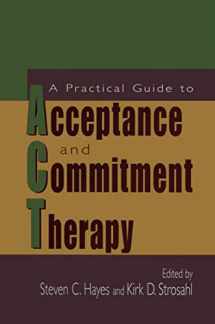
A Practical Guide to Acceptance and Commitment Therapy
Book details
Summary
Description
This book is the most practical clinical guide on Acceptance and Commit ment Therapy (ACT said as one word, not as initials) yet available. It is designed to show how the ACT model and techniques apply to various disorders, settings, and delivery options. The authors of these chapters are experts in applying ACT in these various areas, and it is intriguing how the same core principles of ACT are given a nip here and a tuck there to fit it to so many issues. The purpose of this book, in part, is to emboldened researchers and clinicians to begin to apply ACT wherever it seems to fit. The chapters in the book demonstrate that ACT may be a useful treat ment approach for a very wide range of clinical problems. Already there are controlled data in many of these areas, and soon that database will be much larger. The theory underlying ACT (Relational Frame Theory or "RFT"-and yes, here you say the initials) makes a powerful claim: psy chopathology is, to a significant degree, built into human language. Fur ther, it suggests ways to diminish destructive language-based functions and ways of augmenting helpful ones. To the extent that this model is cor rect, ACT should apply to a very wide variety of behavioral issues because of the centrality of language and cognition in human functioning.


We would LOVE it if you could help us and other readers by reviewing the book
Book review



